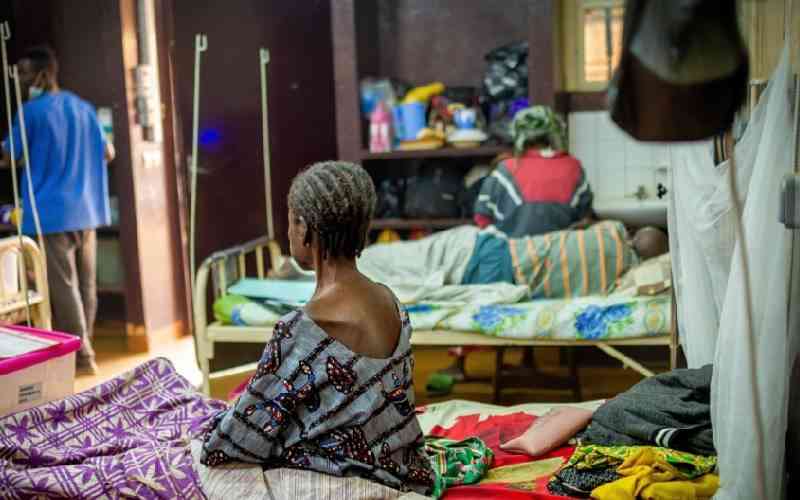
HIV patients in Kenya are terrified when US aid freezes and leaves medications in a storage
Since the U.S. government halted foreign aid, the health clinic in Nairobi, Kenya, where Alice Okwirry picks up her HIV medication, has been limiting antiretroviral supplies to one-month renewals.
Meanwhile, millions of life-saving dosages are stored on a warehouse’s shelves on the outskirts of the city, unused and out of reach.
For Okwirry, the clinic and the warehouse are as far apart as the ocean, even though it’s only a half-hour’s drive.
According to a former USAID official and a health official in Kenya, distribution from the warehouse, which distributes all HIV medications supplied to Kenya by the U.S. government, has stopped due to a lack of U.S. funds, leaving supplies of some medications concerningly low.
The global supply chain for medical items to combat HIV and other diseases has been completely disrupted by the 90-day foreign assistance moratorium that U.S. President Donald Trump imposed after taking office on January 20. Additionally, it is preventing the distribution of medications that have already arrived in their intended nations.
“I was just seeing death now coming,” said Okwirry, 50, who was diagnosed with HIV in 2008. Okwirry has a daughter, Chichi, 15, who also has HIV.
The clinic used to give Okwirry six-month supplies of ARVs, but now they only give one month.
“I told Chichi: what about if you hear the drugs are doomed?” “I’m getting emotional,” Okwirry stated. “She told me: Mom, I’ll be leaning on you.”
Last month, the State Department granted a waiver that exempts HIV treatment funds from the restriction.
However, Mackenzie Knowles-Coursin, the deputy head of communications for USAID, East Africa, until her resignation on February 3 in protest at the agency’s deconstruction, stated that the USAID payments system in Kenya is down following the cuts, which means contractors who carry out the programs cannot be paid.
“Projects are left wondering: ‘Well, how am I going to resume activities if you’re not paying me money?” he stated. “The waivers that have been given are really waivers on paper.”
He stated that Washington officials in Kenya had not approved the transfer of funds needed to distribute the $34 million worth of equipment and medication at the warehouse.
A document obtained by Reuters from the Kenyan government indicates that roughly $10 million is required for that distribution. According to its website, the Christian charity that operates the warehouse, the Mission for Essential Drugs and Supplies (MEDS), provides medications to almost 2,000 clinics across the country.
500,000 malaria medications, 750,000 HIV test kits, and 2.5 million bottles of ARVs are among the goods at the warehouse, Knowles-Coursin told Reuters.
The State Department did not reply to a request for comment from USAID. Requests for feedback from Mission for Essential Drugs and Supplies (MEDS), a Christian charity operating the warehouse in Kenya, were not answered.
According to Deborah Barasa, Kenya’s health minister, her government should raise enough money to release the supplies at MEDS in two to four weeks.
Interviewee: “We have identified the resources that are required,” she stated.
“ANXIETY AND FEAR”
Based on data from the World Health Organization, Kenya has approximately 1.4 million individuals living with HIV, making it the country with the seventh-highest number of people living with HIV worldwide. About 40% of Kenya’s HIV medications and supplies are provided by the President’s Emergency Plan for AIDS Relief (PEPFAR), the primary U.S. funding source for HIV treatment.
Dolutegravir and Nevirapine, two essential HIV medications, are in limited supply statewide, according to a Kenyan health official who asked not to be named due to the delicate nature of the situation. However, the source did not specify how much was left.
HIV and TB coinfections are frequently treated with dolutegravir. Nevirapine is frequently used to stop transmission from mother to child.
After the MEDS stockpiles were published, Barasa, the health minister, stated that there would be enough Nevirapine to last eight months and enough Dolutegravir to last five months.
According to Nelson Otwoma, director of the National Empowerment Network of People Living with HIV/AIDS in Kenya, some patients are currently only able to receive ARVS refills for a week at a time.
U.S. courts are considering lawsuits seeking to force the Trump administration to reinstate thousands of USAID employees who were fired or placed on furlough and restore funds for humanitarian operations.
Secretary of State Marco Rubio announced Monday that over 80 percent of all USAID initiatives had been canceled by the Trump administration.
In an internal brief obtained by Reuters last month, the Kenyan government’s committee on syndemic illnesses calculated that the funding shortages caused by the U.S. cuts were almost $80 million.
Before presenting the 2025–2026 budget in the upcoming months, Finance Minister John Mbadi informed senators last week that the government was considering whether to provide emergency cash to make up for U.S. aid cuts.
All Categories
Recent Posts
Tags
+13162306000
zoneyetu@yahoo.com



